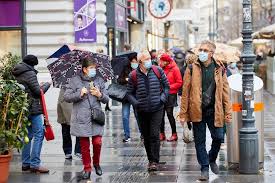By Martin Cole-
Austria is truly getting ready to place millions of people not fully vaccinated against Covid-19 in a national lockdown in a matter of days, as infections rise to record highs, and intensive care units in the country face intense challenges.
The country’s worst-affected province of Upper Austria plans to introduce a lockdown for from Monday next week following recommendations from medical experts, targeting the unvaccinated, in a move bound to be controversial.
It could set a trend for other countries to follow in future, making vacicnated people feel fully rewarded for complying with recommendations to keep the public safe.
National and nternational observers are watching developments closely in Austria, with keen researchers inside and outside the media already seeking details about the country’s rising cases, for closer analysis.
Although an estimated 65% of Austria’s population is fully vaccinated against COVID-19, according to their national statistics, Austria’s government is stepping up its strict measures of protection for its citizens by locking down non compliant citizens of its country.
However, according to data from the European Centre for Disease Prevention and Control, the country has the lowest vaccination rate of any western European country, apart from Liechtenstein , even with its high vaccination rate.
Europe is once again “at the epicentre” of the pandemic with Covid cases at or surpassing record levels due to uneven vaccine coverage and a relaxation of preventive measures, the World Health Organization said last week, adding that 500,000 more deaths are forecast in the region by February.
Coronavirus deaths rose by 10% across the continent over the past week, making it the only world region where both Covid-19 cases and deaths are steadily increasing, according to a WHO report.
Austrian regional governor Thomas Stelzer described the situation as “dramatic” , adding that a lockdown would be introduced “provided there is a legal green light from the federal government or the federal government creates the legal basis”, the Austria Press Agency reports.
Alexander Schallenberg, Austria’s chancellor, has said ‘the pandemic is not yet in the rearview mirror’.
The province has the lowest vaccination rate and the highest infection rate of Austria’s nine provinces, according to government data.
Those who are not vaccinated will have restrictions placed on their daily movements, including bans from restaurants, hotels, hairdressing salons and large public events.
The region will be the first to move into level five of Austria’s five-stage incremental government plan agreed in September that stipulates once 30% of intensive-care beds are occupied by Covid-19 patients, people not vaccinated against the coronavirus will be placed under lockdown. The current level is 20% and rising fast.
“According to the incremental plan we actually have just days until we have to introduce the lockdown for unvaccinated people,” chancellor Alexander Schallenberg told a news conference on Thursday, adding that Austria’s vaccination rate was “shamefully low”.
Many Austrians are sceptical about vaccinations, a view encouraged by the far-right Freedom party, the third-biggest in parliament.
Schallenberg said during a visit to Bregenz in western Austria on Thursday: “I don’t see why two-thirds should lose their freedom because one-third is dithering.
“For me, it is clear that there should be no lockdown for the vaccinated out of solidarity for the unvaccinated.
“A lockdown for the unvaccinated means one cannot leave one’s home unless one is going to work, shopping [for essentials], stretching one’s legs – namely, exactly what we all had to suffer through in 2020,” Schallenberg added, referring to three national lockdowns last year.
The surge of Covid cases in Austria comes at a time when eastern European states, with the continent’s lowest vaccination rates, are experiencing some of the world’s highest daily death tolls per capita.
The number of new coronavirus infections in Austria has risen again to a record high, with 11,975 cases recorded within 24 hours, according to authorities.




